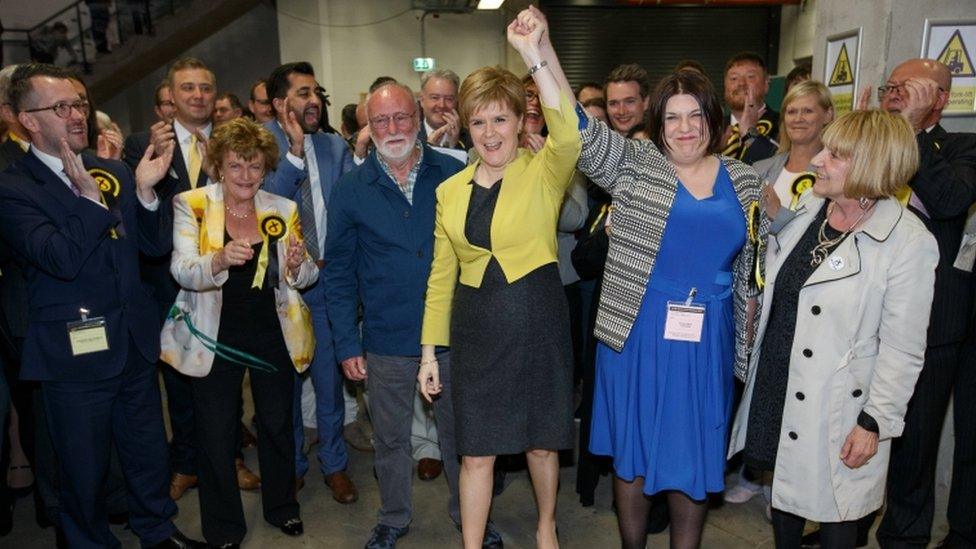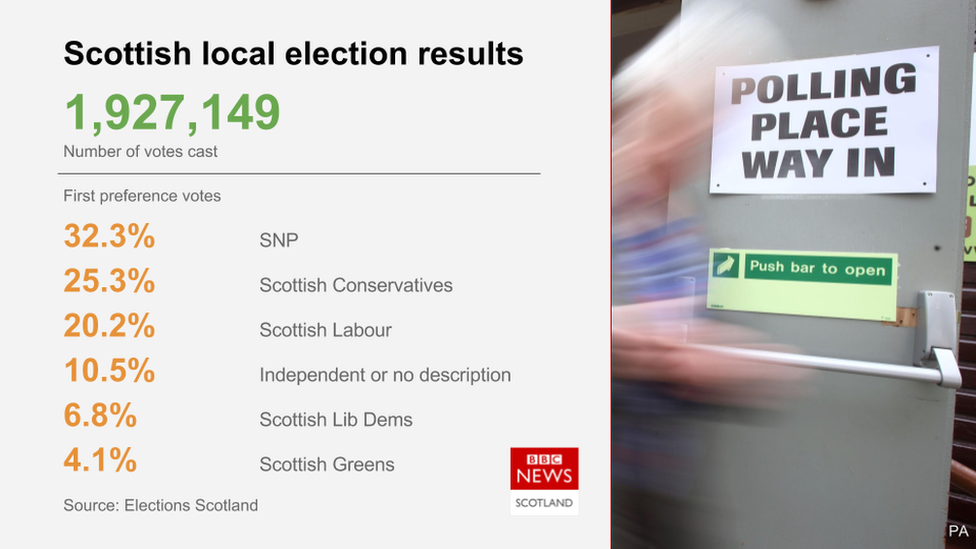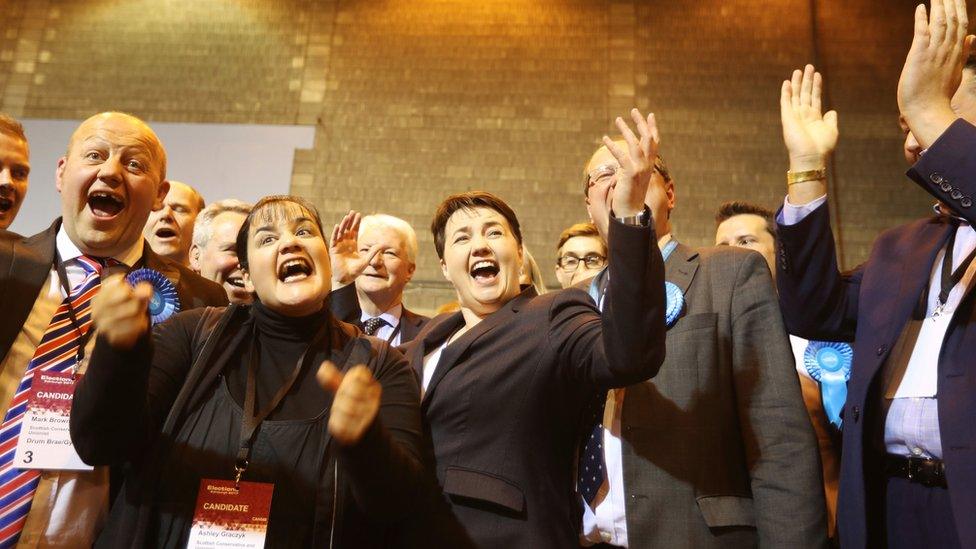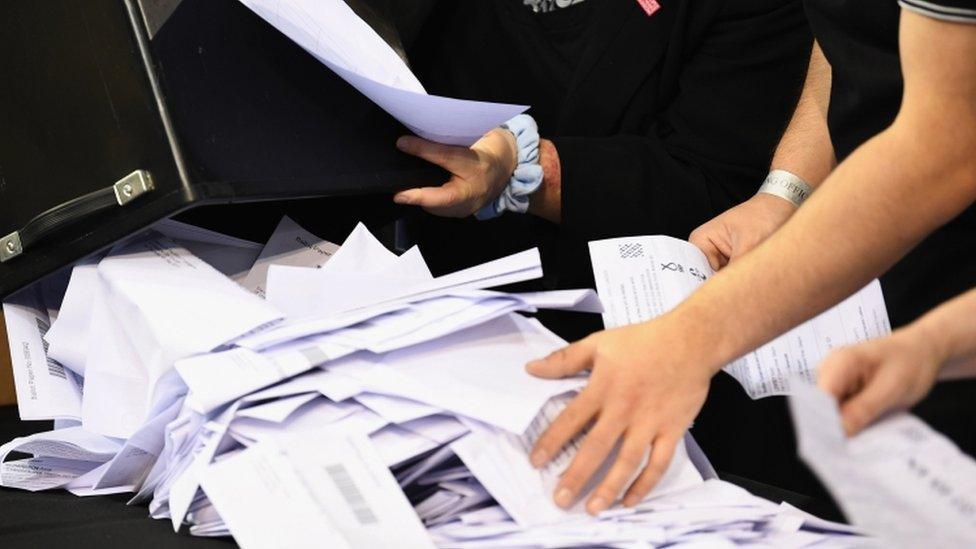Full Scottish council election results published
- Published

Nicola Sturgeon hailed the SNP's results as it replaced Labour as the largest party in Glasgow
The full results of last week's Scottish council election have been published - showing the SNP won 32% of the first preference votes.
The Conservatives finished second overall on 25%, with Labour on 20%, the figures showed, external.
The SNP's share of the vote was unchanged from 2012, with the Conservatives increasing by 12 percentage points.
Overall turnout was 46.9% - higher than the 39.6% recorded in 2012.
The highest turnout was in East Renfrewshire at 57.8% while Glasgow recorded the lowest at 39%.
The SNP secured 610,454 first preference votes in last Thursday's election - an increase from the 503,233 it won in 2012.
But the higher turnout this time around meant the party's share of the vote was 32.3% in both elections.

The SNP also won 431 seats, finishing as the biggest party in 16 of the 32 council areas and joint largest in a further three, although it lost its overall majorities in Dundee and Angus.
Meanwhile, the Scottish Conservatives won 276 seats - 22.5% of the total - after receiving 478,073 first preference votes.
In 2012 the Tories won just 115 seats and received 206,599 votes - a 13.3% share.
The Conservatives finished as the largest party on six councils, and were joint largest alongside the SNP in Stirling.

Ruth Davidson's Conservatives more than doubled their number of council seats
Scottish Labour saw its share of the first preference votes fall from 31.4% to 20.2% and its number of seats from 394 to 262.
Labour also lost overall control of all four councils where it previously had a majority - including Glasgow - and is now the largest party in just three local authority areas and joint biggest in a further one.
Despite the higher turnout, the party received 100,000 fewer first preference votes than in 2012, dropping from 488,703 to 380,957.
The Scottish Liberal Democrats received a 6.8% share of the first preference votes as they won 67 seats, with the Scottish Greens winning 19 seats on 4.1% of the votes.
Almost 200,000 people - 10% of the total - gave their first preference votes to independent candidates, who won 168 seats across the country.
More than 4.1 million people registered to take part in the election - of whom 1.9 million turned out to vote.


Analysis by Professor John Curtice, Strathclyde University
At first glance the SNP scored another remarkable success in last week's local elections. The party won 431 seats, 155 more than their nearest rivals, the Conservatives.
Meanwhile, Labour, who once dominated local government in Scotland were even further behind.
Equally, the official tally of the parties' share of the first preference vote across Scotland as a whole, which was published today, confirms that the SNP was well ahead of the rest of the pack.
However, the task facing the SNP next month is to defend its remarkable success in winning 56 out of Scotland's 59 seats, a success based not on winning a little less than a third of the vote, as on Thursday, but rather on securing 50%.
So, the fact that the party won only 32% in the local elections would seem to raise questions about the SNP's ability to repeat that feat.
But in truth the two figures, the 32% the party won last week and the 50% it secured two years ago, are not directly comparable with each other.

SNP MSP Derek Mackay, who has been announced as the party's campaign director for next month's general election, said the council election results would be an "excellent springboard".
Mr Mackay, the Scottish finance secretary, added: "The SNP has won the local elections emphatically, with more seats than any other party, an increased and higher share of the vote than any other party and as the largest party in more councils than any other party."
A spokesman for the Scottish Conservatives said the results proved it was the only party capable of challenging the SNP across Scotland in the general election.
He added: "Our message is clear. We say No to a second referendum - so we can get government focussed back on the things that matter."
Scottish Labour claimed the results showed that the "Sturgeon surge has turned into a Sturgeon slump".
The party's James Kelly MSP said: "How can Nicola Sturgeon claim to speak for all of Scotland having secured less than a third of the vote? In 2015 the SNP secured half of the Scottish vote, and these official figures show that has now plummeted by 18 points."
Scottish Liberal Democrat leader Willie Rennie has previously said that the council results suggested his party could challenge the SNP in key constituencies in the general election.
And the Scottish Greens hailed their "breakthrough" in areas such as Glasgow and Edinburgh, with the party winning a total of 19 seats - five more than in 2012.